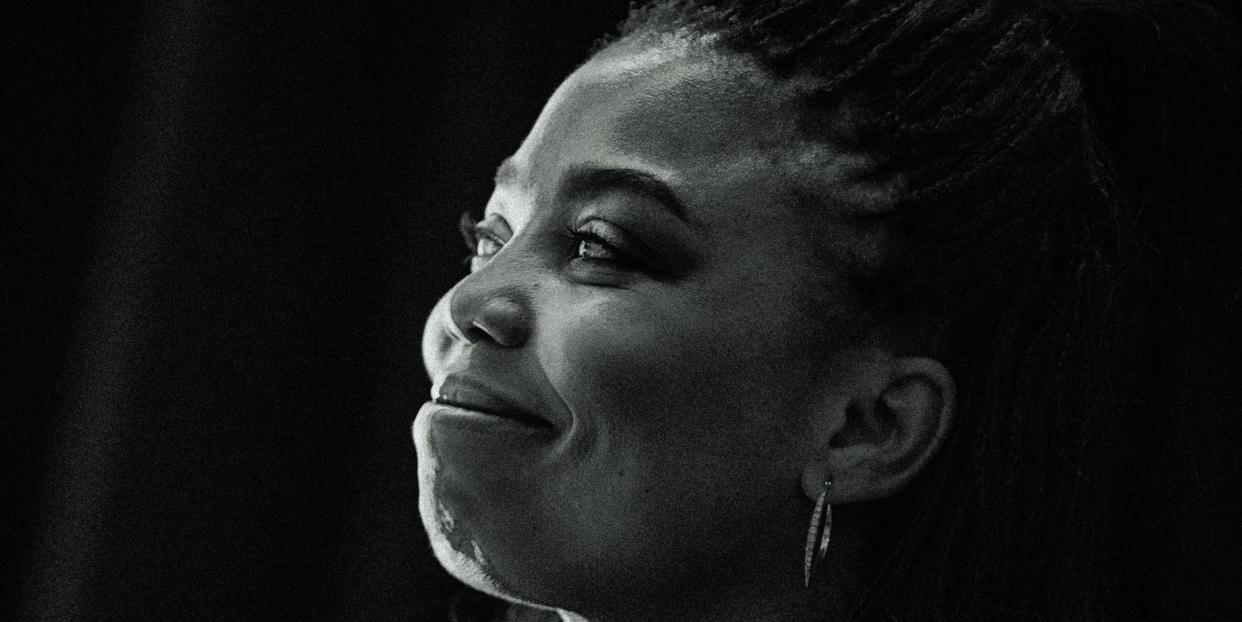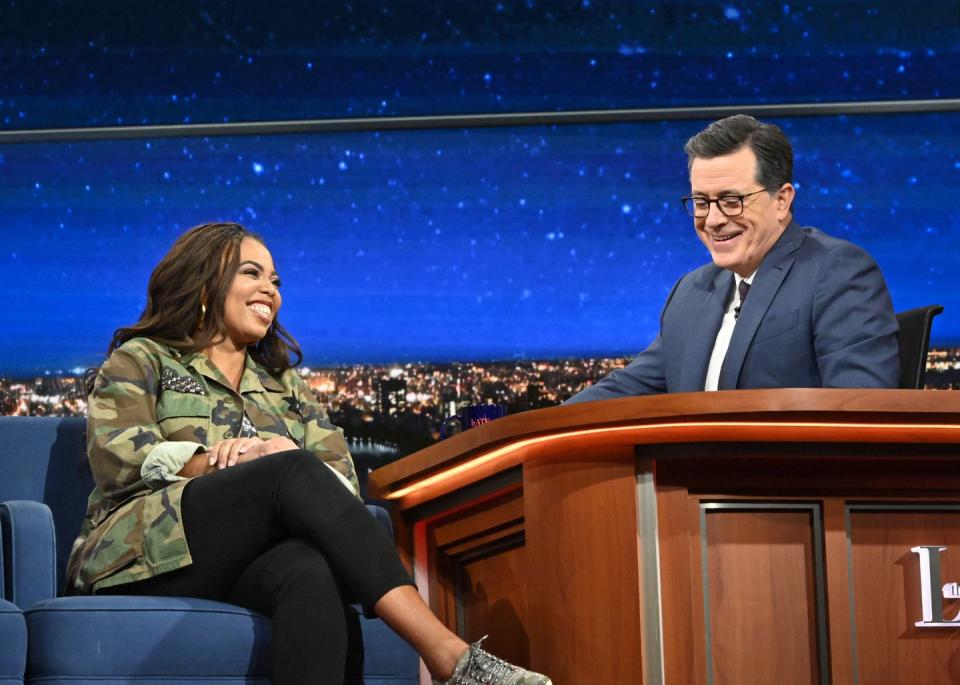Jemele Hill on the Politicization of Sports, Twitter Trolls, and Her Upcoming Podcast

On September 13, 2017, Jemele Hill found herself among the growing list of journalists targeted by President Donald Trump and the White House. The reason: Hill, an anchor of ESPN’s SportsCenter at the time, had tweeted criticism of Trump, calling him a white supremacist. Press Secretary Sarah Huckabee Sanders called Hill’s tweet “a fireable offense.” ESPN issued a statement that it did not share its anchor’s views. “With Jemele Hill at the mike, it’s no wonder ESPN’s ratings have tanked....” Trump tweeted. Debate raged about whether sportscasters should be allowed to address politics, even in a climate that saw Colin Kaepernick and other athletes protesting the national anthem. A year later, after 12 years with the company, Hill amicably parted ways with ESPN.
Donald Trump is a white supremacist who has largely surrounded himself w/ other white supremacists.
- Jemele Hill (@jemelehill) September 11, 2017
Born in Detroit and a graduate of Michigan State University, Hill started her career as a cub reporter for Raleigh’s The News & Observer and then the Detroit Free Press. She spent almost a decade in local newspapers before joining ESPN, working her way up from columnist to podcaster to coanchor of SportsCenter, where she and Michael Smith broke the mold of the sports network’s flagship show by discussing current events.
For Hill, playing fields have always been fertile terrain for social commentary. They are among the “few avenues where people of color can gain wider acceptance in society,” she says. And, she adds, “Sports is one of the few things that we do together. We may not worship together. We may not eat together. But when it’s the Olympics, all Americans are rooting for other Americans, whether they look like them or not. Sports have this unique ability to bring in issues of gender, race, and culture.” Hill now deftly tackles all those issues and more as a staff writer for the Atlantic, a position she took last October. This month, she’ll debut a Spotify podcast (still untitled at press time), which she says will be about as close to hanging out with her as it gets (“minus us being at a bar,” that is). This past February, shortly after the Super Bowl, she spoke to ELLE about Colin Kaepernick, Megyn Kelly, and defying stereotypes.
ELLE: Where were you when you found out that Trump had tweeted about you?
Jemele Hill: I was asleep, and my phone started going o . I don’t follow the president on Twitter, but I think he tweets a lot in the early morning. That day my schedule was such that I didn’t have to work until 12:30 p.m. It was surreal. But I took it in stride. When I got to work, we were making jokes about it. Trump criticizing somebody on Twitter is not new. As big as that moment was in my life and career, there’s no specialness with it. He does it all the time. I was just the latest person.
What do you say to people who think there’s no room for politics in sports?
People who would prefer that they be separate clearly don’t recognize that sports have always been tied to social issues. Jackie Robinson integrated Major League Baseball in 1947, almost 20 years before the Civil Rights Act passed. The moment you go to an NFL game, it is inherently political. You have the national anthem, flyovers, a military presence. Those are all political symbols. Also, every time they put up a new stadium or arena, who do they come to for the money? Taxpayers. So I think that people who don’t want politics in sports are just being, frankly, intellectually lazy. They just don’t want politics they disagree with in their sports. There are so many examples of non-sports issues mixing with sports. ESPN has done some incredible fundraising for cancer. I don’t hear anybody say “stick to sports” when that happens. But when it’s Colin Kaepernick, racism, or police brutality, then they want to stick to sports. That has more to do with the subject than them wanting sports to be absent of heavier issues.

Do you think Kaepernick has been successful?
I do. To me, he won Super Bowl week. His message is just as strong as, if not stronger than, it was on the day when he first took a knee. He is the sin the NFL will constantly be paying for. They decided that they’d rather have him out of the league for fear of whatever backlash they might receive, be it from a conservative fan base or Donald Trump. I think because they’re on the wrong side of history, they’re always going to pay for this.
How the people who swore Colin Kaepernick wasn’t in the NFL because of talent reacted when they saw the league settled Kaepernick’s collusion case pic.twitter.com/HcPxav536L
- Jemele Hill (@jemelehill) February 15, 2019
You’ve talked about how female sportscasters are often forced into a stereotypical role, telling men to settle down or kicking the show to commercials. How did you break that pattern?
Initially, I never saw television as a long-term career option for me. As the saying goes, I’m here for a good time, not a long time. So I went in there being myself and only worried about doing the job at hand. My advice to young journalists is to focus on what you can control: your work ethic, your preparation. What you can’t control is somebody who has a negative stereotype of what women can o er or what roles women can play. It’s okay to push, to ask that your opinion be considered, because that matters.
What can people expect from the new podcast?
I’m in a unique and exhilarating point in my career. I’ve built 20-plus years of journalistic credibility, so now I feel empowered to spread myself out more creatively. This podcast will tackle critical issues, but I also want to have fun. People have this misguided perception that I’m always serious. That couldn’t be further from the truth. I joke a lot. But you have to bring a sense of fearlessness to commentary. It’s like a journalist told me when I first started writing: “You have to dance like nobody is watching.” And in order to do that, you have to do it from an unbothered state of mind.
Speaking of commentary, NBC fired Megyn Kelly after her statements about blackface. She, too, has been the subject of Trump’s ire. Would you ever have her on your show?
Oddly enough, it’s people like her and Matt Lauer who inspired me to pursue television, because I saw what their contracts looked like! As for the podcast, I am all for having different viewpoints represented; I’m just not going to capitulate to stupid and give stupid a platform. So, say, somebody like Tomi Lahren, never. But Megyn Kelly? I mean, who knows?
This article originally appeared in the April 2019 issue of ELLE.
('You Might Also Like',)

